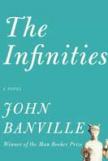Beyond the Earthly Realm
John Banville’s novel The Sea snagged the prestigious and lucrative Man Booker Prize in 2005, though not without controversy. Subsequent reports revealed that the five-person judging panel was split between Banville’s haunting story of a man revisiting his past and Kazuo Ishiguro’s Never Let Me Go. Analyzing the Booker controversy, The Guardian dubbed Banville a literary “outsider” whose previous books—including the Booker-nominated Book of Evidence (1989), The Untouchable (1997) and Shroud (2003)—were “known only by a few enthusiasts.”
This neatly captures John Banville’s place in the contemporary literary canon. He is more respected than read, a writer’s writer, whom even admirers admit can be difficult.
Banville himself does little to discourage this classification. His prose is gorgeous but is often filled with multisyllabic oddities such as “cartilaginous” and “crepitant.” He is a Dubliner, yet his novels are not obviously “Irish,” even in a tradition wide and diverse enough to include Laurence Sterne, Oscar Wilde, Roddy Doyle and Elizabeth Bowen. And yet, one of Banville’s key influences is himself an Irish outsider: Samuel Beckett. Banville revels in self-consciousness in extremis. Like Beckett, he pulverizes the wall between writer and reader with his radically unreliable narrators.
In fact, Banville recently took his fascination with the forms and structures of fiction one step further. Since 2006, he has published three plot-driven thrillers under the name Benjamin Black. It is as if Banville, a notorious esthete, became tired of pretending the worlds of literary and popular fiction were not strictly segregated. Banville’s latest novel, The Infinities, is decidedly literary, not to mention mythical, philosophical and comical. The plot, such as it is, revolves around an aged genius named Adam, whose mathematical innovations changed the course of human history by revealing a “hitherto unimagined realm…beyond the infinities.”
As one would expect in a Banville novel, Adam—whose work allowed humans to grasp a sense of the eternal—is now comatose. Talk about an infinite jest. Speaking of the eternal, The Infinities is (mostly) narrated by the Greek god Hermes. (“You don’t say, you say,” Banville later winks.) The novel is populated by numerous other mythical ghosts, who drift in and out of Adam’s home and even his body. In one exquisite scene, Hermes’s father, Zeus, occupies the consciousness of Adam’s son (also named Adam) and makes love to his beautiful wife. In case we had any doubt about what’s going on here, it should be noted that Adam (what, no Eve?) is given the last name Godley. A visiting friend is named Grace.
At its most inventive, The Infinities poses bold questions about artistic and religious creation and the degree to which we control or are controlled. But it also preserves Banville’s reputation as a difficult writer. The narrative, which unfolds over a single day, occasionally feels excessively discursive. Some digressions are fascinating, and Banville’s writing is, once again, gorgeous as well as clever. (“For dear life is what I could never quite get the hang of.”)
But the earthly characters generally do not come into focus clearly enough. The reader becomes so consumed by the pyrotechnics of Banville’s narrator that the characters around whom the narrative revolves can get lost in the verbal fog.
At one point, Adam’s son has come to visit his dying father one last time, and we are drawn into the skeleton-filled closet of the Godley family. There are wonderful moments, particularly in Banville’s exploration of “old Adam’s” two marriages, and how they have affected the children, younger Adam, as well as even younger Petra, a bit of a mystic with a boyfriend whose interest in old Adam borders on the bizarre.
As a whole, however, the novel is never quite as brilliant as its parts. All the self-referential witticisms, flashbacks, fast-forwards and alternate realities (the world has changed, after all, thanks to Adam’s innovations) may prove a bit excessive even for some Banville partisans. Banville has spent his career creating characters who become more, rather than less, unknowable as the narrative progresses. In his underrated novel Shroud, for example, we meet a 1930s Jewish academic who may or may not have written a series of articles providing Nazi ideology with intellectual heft. The point of reading such a novel, of course, is to figure out who this guy “really” is. To which Banville would surely answer: “Why bother?” After all, as the narrator of Shroud puts it: “I can’t believe a word out of my own mouth.”
With his latest novel Banville has now taken his obsession with identity, masquerading and deceit beyond the earthly realm. The book does not quite measure up to the author’s best work, though it does have its heavenly moments.
This article also appeared in print, under the headline “Beyond the Earthly Realm,” in the April 26, 2010, issue.








